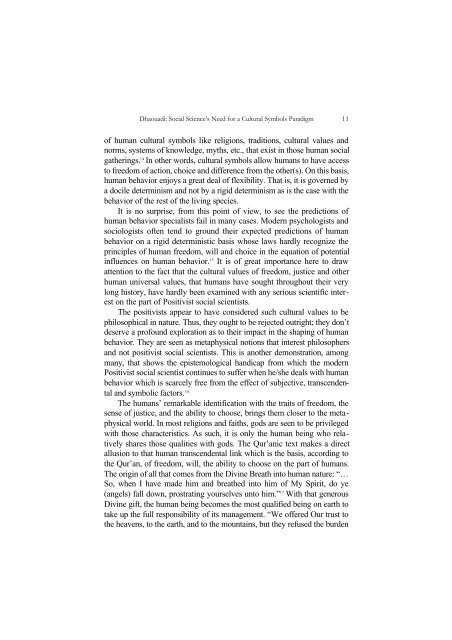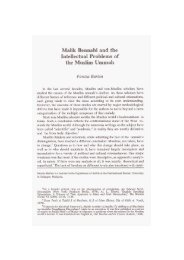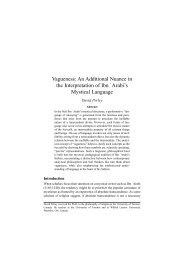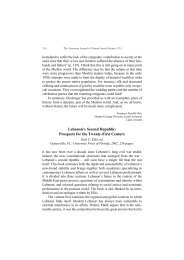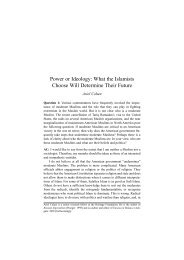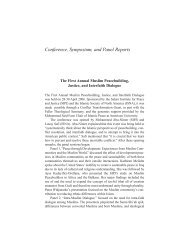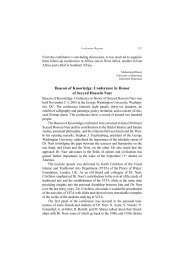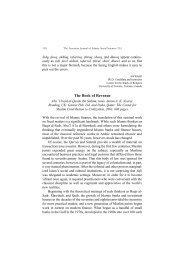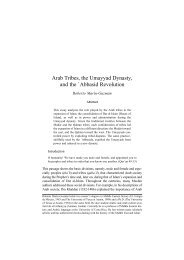Social Science's Need for a Cultural Symbols ... - Epistemology
Social Science's Need for a Cultural Symbols ... - Epistemology
Social Science's Need for a Cultural Symbols ... - Epistemology
Create successful ePaper yourself
Turn your PDF publications into a flip-book with our unique Google optimized e-Paper software.
Dhaouadi: <strong>Social</strong> Science’s <strong>Need</strong> <strong>for</strong> a <strong>Cultural</strong> <strong>Symbols</strong> Paradigm 11<br />
of human cultural symbols like religions, traditions, cultural values and<br />
norms, systems of knowledge, myths, etc., that exist in those human social<br />
gatherings. 14 In other words, cultural symbols allow humans to have access<br />
to freedom of action, choice and difference from the other(s). On this basis,<br />
human behavior enjoys a great deal of flexibility. That is, it is governed by<br />
a docile determinism and not by a rigid determinism as is the case with the<br />
behavior of the rest of the living species.<br />
It is no surprise, from this point of view, to see the predictions of<br />
human behavior specialists fail in many cases. Modern psychologists and<br />
sociologists often tend to ground their expected predictions of human<br />
behavior on a rigid deterministic basis whose laws hardly recognize the<br />
principles of human freedom, will and choice in the equation of potential<br />
influences on human behavior. 15 It is of great importance here to draw<br />
attention to the fact that the cultural values of freedom, justice and other<br />
human universal values, that humans have sought throughout their very<br />
long history, have hardly been examined with any serious scientific interest<br />
on the part of Positivist social scientists.<br />
The positivists appear to have considered such cultural values to be<br />
philosophical in nature. Thus, they ought to be rejected outright; they don’t<br />
deserve a profound exploration as to their impact in the shaping of human<br />
behavior. They are seen as metaphysical notions that interest philosophers<br />
and not positivist social scientists. This is another demonstration, among<br />
many, that shows the epistemological handicap from which the modern<br />
Positivist social scientist continues to suffer when he/she deals with human<br />
behavior which is scarcely free from the effect of subjective, transcendental<br />
and symbolic factors. 16<br />
The humans’ remarkable identification with the traits of freedom, the<br />
sense of justice, and the ability to choose, brings them closer to the metaphysical<br />
world. In most religions and faiths, gods are seen to be privileged<br />
with those characteristics. As such, it is only the human being who relatively<br />
shares those qualities with gods. The Qur’anic text makes a direct<br />
allusion to that human transcendental link which is the basis, according to<br />
the Qur’an, of freedom, will, the ability to choose on the part of humans.<br />
The origin of all that comes from the Divine Breath into human nature: “…<br />
So, when I have made him and breathed into him of My Spirit, do ye<br />
(angels) fall down, prostrating yourselves unto him.” 17 With that generous<br />
Divine gift, the human being becomes the most qualified being on earth to<br />
take up the full responsibility of its management. “We offered Our trust to<br />
the heavens, to the earth, and to the mountains, but they refused the burden


